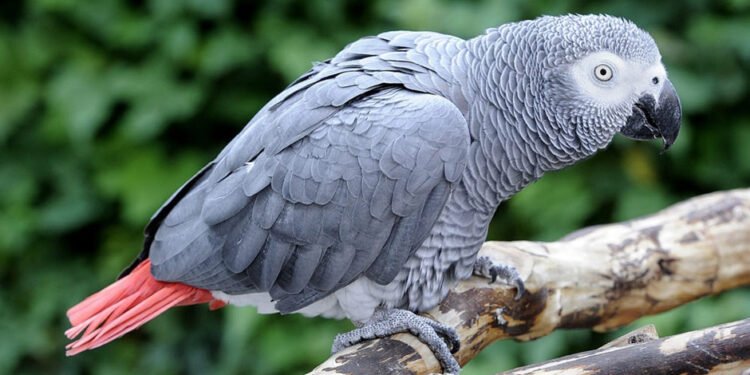Adding a feathered friend to your family can be an exciting yet daunting decision. Among the many avian species available, the African Grey Parrot stands out not only for its striking appearance but also for its remarkable intelligence and social nature.
Before we get into the details of caring for African Grey Parrots, it’s good to keep in mind that the people who want to adopt this beautiful bird are likely to be:
- Considering adding a pet to their family: They may be new to pet ownership or looking to expand their current family of animals.
- Interested in intelligent and social companions: They seek pets that can engage with them on various levels, from conversation to play.
- Prepared for a long-term commitment: They understand that owning a pet is a significant responsibility that lasts many years.
If you’re considering welcoming an African Grey Parrot into your home, take the time to research African Grey parrot for sale thoroughly and reflect on your capacity for commitment.
Personality Traits of African Grey Parrots
African Grey Parrots are renowned for their exceptional intelligence. They possess the ability to learn a wide array of words and phrases, often mimicking human speech with remarkable accuracy. Their cognitive abilities allow them to solve problems, recognize patterns, and even understand context in conversations. This intelligence means that they require mental stimulation and engaging activities to prevent boredom, which can lead to undesirable behaviors.
These birds are highly social creatures that thrive on interaction. In the wild, they live in flocks and develop strong bonds with their companions. As pets, they crave attention and affection from their owners. This sociability means that neglect can lead to loneliness, anxiety, and destructive behaviors. Owners should be prepared to spend a significant amount of time engaging with their African Grey to ensure they remain happy and healthy.
While their vocal abilities can be a source of entertainment, potential owners should be aware of the noise level associated with African Greys. They can mimic not only human voices but also household sounds, and their vocalizations can range from soft chirps to loud screeches. Training can help manage their vocal habits, but it’s essential to understand the potential for noise, especially in shared living spaces.
Lifestyle Considerations
African Grey Parrots require daily interaction and attention. Ideally, an owner should allocate several hours each day to bond with their bird through play, training, and socialization. Leaving them alone for extended periods can lead to behavioral issues, including feather plucking and aggression.
Space is vital for an African Grey’s well-being. They need a large, spacious cage that allows them to stretch their wings and move around comfortably. A suitable cage should be at least 24 inches wide, 36 inches high, and 24 inches deep, with horizontal bars for climbing. Additionally, they benefit from a safe play area outside of their cage where they can exercise and explore.
Owning an African Grey is a financial commitment that should not be overlooked. Monthly expenses include high-quality pellets, fresh fruits and vegetables, and occasional treats. Additionally, budgeting for veterinary care—including routine check-ups, vaccinations, and emergency treatments—is crucial. Toys and enrichment items also contribute to ongoing costs, as these birds require regular stimulation to stay engaged and healthy.
Veterinary Care
Routine veterinary visits are essential for maintaining an African Grey’s health. Just like any pet, they should receive annual check-ups to monitor their overall condition and catch any potential health issues early.
Finding a veterinarian who specializes in avian care is critical. Avian veterinarians have the training and expertise to address the unique health needs of birds. Regular visits to these specialized practitioners can help ensure that your bird receives the best possible care.
African Grey Parrots are susceptible to a few specific health problems. Feather plucking, often a sign of stress or boredom, can lead to significant health issues. Respiratory infections are also common due to their sensitive respiratory systems. Owners should be vigilant for any signs of illness, such as changes in behavior, appetite, or appearance, and seek veterinary attention promptly.
Training and Enrichment
Training your African Grey using positive reinforcement techniques is key to fostering a strong bond and encouraging desired behaviors. Rewarding them with treats, praise, or playtime when they perform desired actions can motivate them to learn and engage positively with their environment.
Providing mental stimulation is crucial for preventing boredom. Toys that challenge their intellect, such as puzzles or foraging toys, can keep them entertained. Rotating toys regularly can help maintain their interest and provide new challenges.
Early socialization is beneficial for African Greys. Introducing them to different people, environments, and experiences can help them become well-adjusted companions. This exposure reduces the likelihood of fearfulness or aggressive behavior later in life.
Commitment and Responsibility
One of the most significant considerations when adopting an African Grey is their lifespan. These birds can live for 40 to 60 years or more with proper care. Potential owners should be prepared for a long-term commitment, possibly affecting life plans and stability.
When deciding to bring an African Grey into your home, consider whether to adopt from a rescue organization or purchase from a breeder. Adoption can give a bird a second chance at a loving home, while purchasing may provide a bird with a known background. Each option has its pros and cons, and potential owners should weigh their choices carefully.
The pet trade raises ethical concerns regarding the treatment of birds in captivity. Researching the source of your bird, whether adopting or purchasing, is essential to ensure that you are not contributing to unethical practices. Supporting reputable breeders or rescue organizations can help promote better treatment for avian species.
Additional Tips and Resources
Many current African Grey owners share their experiences, emphasizing the joys and challenges of owning these magnificent birds. Personal anecdotes often highlight the deep bonds formed between humans and their feathered companions, showcasing the unique and fulfilling relationships that can develop.
To further enhance your understanding of African Grey care, consider exploring resources from reputable avian organizations and veterinary associations. Websites such as the American Association of Avian Veterinarians (AAAV) and the Association of Avian Veterinarians are excellent starting points for finding information and connecting with professionals..
In summary, African Grey Parrots are extraordinary companions that require significant time, commitment, and care. Understanding their needs and personality traits is crucial for potential owners to make informed decisions. With dedication and love, these intelligent birds can enrich your life in ways you never imagined possible.












